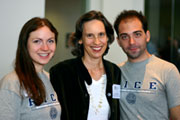Careers Forum Outcomes |
||||||||||||
|
||||||||||||
Shepherd Careers Forum 2007 |
||||||||||||
|
||||||||||||
Distinguished Guests |
||||||||||||
|
||||||||||||
Forum Participants |
||||||||||||
|
||||||||||||
Forum Coordinators |
||||||||||||
|
| Shepherd Careers Forum ’07 Convening Student Perspectives and Creating New Models for the 21st Century Like beauty, success is defined in the eye of the beholder. Most classical music students tend to define their future success as a career playing in orchestras, chamber groups or as a soloist. This traditional view leaves other important career opportunities overlooked, a situation Rice's Shepherd School of Music is determined to remedy. Already known for its leadership in training top-tier classical musicians, the Shepherd School officially launched a national effort to reset students' definition of career success with the Oct. 12-14, forum "Careers in Music Performance: Convening Student Perspectives and Creating Models for the 21st Century." Students and faculty from the most highly respected music training institutions in the U.S. attended, including New England Conservatory, Oberlin Conservatory, Northwestern University and Juilliard. The conference, the brainchild of Benjamin Kamins, professor of bassoon, and Janet Rarick, artist teacher of professional development, included performances, workshops and discussions. Kamins knows firsthand about career challenges, having left a position in a major orchestra to pursue his passion for music through a combination of teaching and performing. "When students have a narrow view of the profession, they limit themselves in finding their own best career path," Kamins said. "There is a misconception amongst music students that you get a job in an orchestra and you live happily ever after. It's incredible to get and keep that job, but it doesn't guarantee artistic satisfaction." The forum is just the latest and most visible of a three-year effort by Kamins and Rarick to help Shepherd School students prepare for and respond to career challenges. "It seemed natural to have very gifted young performers come together to draw positive, creative energy from each other to formulate possible new directions for our profession," Kamins said. "New research tells us that student perceptions about music careers are significantly influenced by their interaction with their peer groups." That research was conducted by a former Shepherd School student turned sociologist, Shoshana Dobrow. Dobrow presented her findings from the "Longitudinal Study of Musical Involvement," which was funded by Rice's Humanities Research Center. "Social influences, from both peers and from parents, can have a powerful effect on musicians’ sense of calling and on their career decisions," Dobrow said. "These findings are intriguing to me because we tend to think of "a calling" as being something very personal and very internal -- not something subject to social influence, as my research is showing." Dobrow is also a professional bassoonist who has performed on Broadway and at Carnegie Hall and is currently a member of the Rhode Island Philharmonic. "The Careers Forum is revolutionary in many respects," Dobrow said. "In contrast to 'traditional' music career education, this forum makes a public statement that musicians and music educators need to -- and are able to -- reconceptualize what a career in music can be like.” Dobrow will use findings from the conference to submit articles to national industry journals and to facilitate her ongoing research on careers in music. Robert Yekovich, dean of the Shepherd School, sees real potential in the forum. "The ideas generated by these talented students truly have the potential to influence the way schools of music deliver instruction and offer guidance to career-minded musicians in the future," Yekovich said. "The Shepherd School of Music was delighted to foster collaboration and discussion around important issues affecting young, classical musicians by serving as host of the Careers Forum." National experts engage students The forum was moderated by Eric Booth, a nationally recognized consultant to seven of the nation's 10 largest orchestras and founding editor of the Teaching Artist Journal, the first peer-reviewed professional journal in the field. Currently a faculty member at the Juilliard School, Booth founded the Art and Education program at Juilliard and is the artistic director of the mentoring program. "What is at stake, in my view, is nothing less than the future of classical music," Booth said. "We are delving deeply into identifying and building the skills that are essential to develop a 21st century musician, not just a buffed-up, teched-up 19th or 20th century musician." In addition to discussion and workshops, music was continuously present at the forum. Cutting-edge classical music ensembles eighth blackbird and The Chiara String Quartet performed, challenging student participants to create a short, interactive public performance on the last day of the conference. The "lab performances" incorporated the weekend's learning and creative energy. "The students from the best conservatories across the country were willing to open their minds and come up with creative ways to discuss, present and interpret music," said Matt Albert, member of eighth blackbird. "We hope this kind of gathering can be repeated, supporting this generation of musicians that seems eager to challenge the assumptions that have been made about the role classical music can play in the 21st century." The Careers Forum was funded by Rice's Faculty Initiative Fund. |

|
|||||||
Copyright ©2007, Shepherd School of Music
